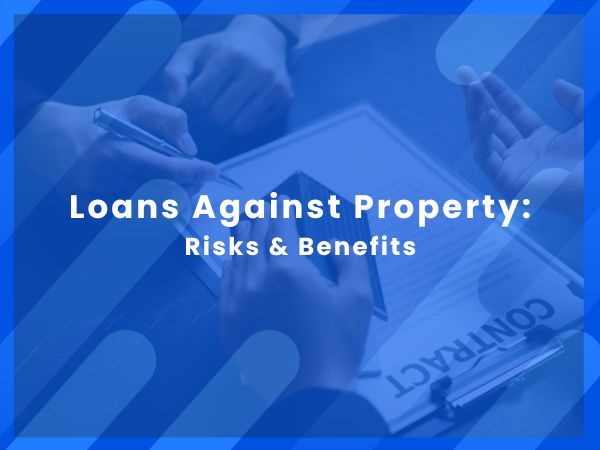South Africa’s economy is very up and down, so property owners, business owners and property investors often find themselves in need of capital for various ventures. Whether it’s to fund a business opportunity, consolidate debt, or finance a child’s education, leveraging the equity built up in a property can be a viable solution. One such option is short-term loans against property, also known as equity release.
What is a Short-Term Loan Against Property?
A short-term loan against property is a secured loan where the borrower’s property acts as collateral. Unlike a traditional bond, where funds are used to purchase the property, lending against property allows you to access a portion of your property’s value in cash while retaining ownership. This type of loan is available to those who own fully paid-up properties, meaning they hold the title deed and have no outstanding mortgage.
Who Qualifies for an Loan Against Property in South Africa?
- Property Ownership: Applicants must own the property outright with no existing bond. This applies to residential properties valued at over R2 million and all types of commercial properties (industrial, agricultural, etc.).
- Clear Title Deed: The property title deed must be free of any encumbrances or restrictions that could hinder the loan process.
- Creditworthiness: Lenders will assess the applicant’s credit history and financial stability to determine their ability to repay the loan.
- Property Valuation: A professional valuation of the property will be conducted to ascertain its current market value, which influences the loan amount.
Benefits of Short-Term Loans Against Property
- Access to Significant Capital: Loans against title deed in South Africa allow you to unlock substantial funds, often up to 70% of the property’s market value. This can provide a significant cash injection for various needs.
- Lower Interest Rates: Compared to unsecured loans, loans against your property generally have lower interest rates due to the security provided by the property.
- Flexible Repayment Terms: A Short-term loan against house deed typically offers flexible repayment options, with terms ranging from a few months to a few years, catering to individual needs.
- Retain Property Ownership: You retain full ownership of your property throughout the loan term.
- No Early Repayment Penalties: Many lenders allow for early repayment without incurring penalties, providing financial flexibility.
- Quick Access to Funds: The approval process for loans against property can be faster than traditional loans, providing timely access to funds.
Risks of Unbonded Property Loans
- Risk of Repossession: Failure to meet the repayment terms can lead to the lender repossessing and selling the property to recover the outstanding debt.
- Interest Rate Fluctuations: While generally lower than unsecured loans, interest rates on loans against property can fluctuate, impacting your repayment amounts.
- Impact on Credit Score: Late or missed payments can negatively affect your credit score, hindering future borrowing opportunities.
- Fees and Charges: loans against paid up property may involve various fees, including valuation fees, legal fees, and administration fees, adding to the overall cost.
- Equity Reduction: As you borrow against your property’s value, your equity decreases. This can limit your future borrowing capacity.
Factors to Consider Before Using Property As Security For a Loan
- Loan Amount and Term: Carefully assess the required loan amount and choose a loan term that aligns with your repayment capacity.
- Interest Rates and Fees: Compare interest rates and associated fees from different lenders to secure the most favorable terms.
- Repayment Plan: Develop a realistic repayment plan to avoid defaulting on the loan and jeopardizing your property.
- Alternative Options: Explore alternative financing options, such as personal loans or business loans, to determine the most suitable solution.
- Professional Advice: Consult with a financial advisor or mortgage broker to understand the implications of an LAP and make informed decisions.
Loans Against Property vs. Other Financing Options
- Mortgage Bond: A mortgage is used to purchase a property, while an LAP leverages existing equity for other purposes.
- Home Equity Loan: Similar to a loan against property, but typically with longer terms and fixed interest rates.
- Personal Loan: Unsecured loan with higher interest rates and no property as collateral.
- Business Loan: Specifically for business purposes and require your business to have been trading for at least 12 months and made over R1 million in sales.
Choosing the Right Lender
Selecting the right lender is crucial when considering a loan against unbonded property. Compare offerings from various banks, non-bank lenders, and private lenders in South Africa. Consider factors such as:
- Interest rates and fees: Look for competitive rates and transparent fee structures.
- Loan terms and flexibility: Choose a lender offering terms that suit your needs and repayment capacity.
- Customer service and reputation: Opt for a lender with a strong reputation for customer service and ethical lending practices.
- Speed of approval and disbursement: Consider the lender’s turnaround time for loan approval and fund disbursement.
In South Africa, the short term loan market is regulated by the National Credit Act (NCA), which protects consumers from reckless lending practices. Ensure the lender you choose is registered with the National Credit Regulator (NCR) and adheres to the NCA guidelines.
Conclusion
A short-term loan against property can be a valuable financial tool for South African property owners seeking access to capital. However, it’s essential to carefully weigh the risks and rewards before making a decision. By understanding the requirements, benefits, and potential drawbacks, and by choosing the right lender, you can leverage your property’s equity effectively while mitigating risks. Remember to consult with financial professionals and conduct thorough research to make informed choices that align with your financial goals.


